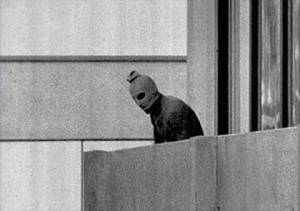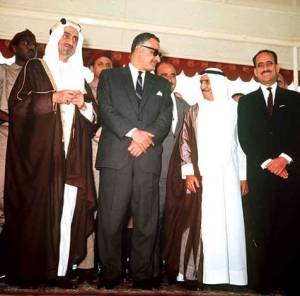Palestinian terrorists kill 11 Olympic athletes and the Arab League rejects Israeli peace initiatives, vowing to continue fighting the Jewish state.


A Palestinian terrorist on his way to murder Israeli athletes in Munich in 1972. (Wikipedia)
Palestinian Terrorists Massacre 11 Israeli Athletes
On September 5, 1972, a day before the Olympic Games were to begin in Munich, eight Palestinian terrorists killed two members of the Israeli team and took nine others hostage.
The terrorists, members of Black September, a faction of the Palestine Liberation Organization (PLO), were demanding the release of 234 Palestinians being held in Israeli prison and safe release from Germany.
The attack began just after 4 a.m., when the terrorists jumped over the six-foot-high fence that surrounded the Olympic Village, where the athletes were sound asleep, and headed straight for the Israeli group. Some fought back and others escaped.
An hour later, police were alerted and the news made headlines around the world. By 5 p.m., after a day of negotiations, the Germans organized a plan to end the crisis but did not succeed. In a gunfight that ensued, five terrorists and all nine hostages died.
The following day a memorial service for the murdered Israeli athletes was held, but the games continued nonetheless.
“Incredibly, they’re going on with it,” commented Jim Murray of the Los Angeles Times. “It’s almost like having a dance at Dachau,” he wrote at the time, referring to an infamous concentration camp during the Holocaust situated about 20 miles from Munich.
Arab League Refuses to Discuss Peace with Israel
On Sept. 1, 1967 – three months after Israel’s stunning Six Day War victory – the Arab League issued the Khartoum Resolution, according to which the hostilities against the Jewish state would continue.

Arab leaders at Khartoum summit in 1967, L to R: Faisal of Saudi Arabia, Nasser of Egypt, Sallal of Yemen, Sabah of Kuwait and Arif of Iraq. (Wikipedia)
The leaders of eight countries belonging to the Arab League – Egypt, Syria, Jordan, Lebanon, Iraq, Algeria, Kuwait and Sudan – attended a summit conference in Khartoum, Sudan, from August 29 through September 1, where they discussed strategy and future goals in the wake of Israel’s defeat of Egypt, Jordan and Syria in the June 1967 war. On the third and final day of the meeting, they passed the Khartoum Resolution, calling for a continued state of belligerency with Israel.
Immediately following the Six Day War, Israelis were hopeful that their victory – including the liberation of the Old City of Jerusalem and the biblical heartland of Judea and Samaria, as well as the capture of the Sinai and the Gaza Strip – would motivate their Arab neighbors to discuss the possibility of an Israeli withdrawal from the territories in exchange for peace. “Israel is waiting for a phone call from the Arabs,” then Defense Minister Moshe Dayan stated. Then-Minister of Foreign Affairs Minister Abba Eban announced that “everything is negotiable.”
The conference, which concluded with a unified Arab policy that remained intact for several years, became famous for what is known as the three no’s: No peace with Israel, no negotiations with Israel and no recognition of Israel.










